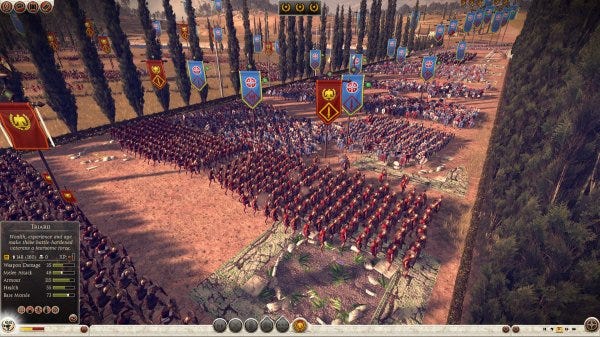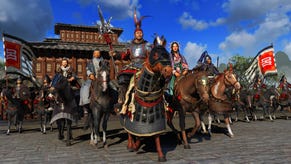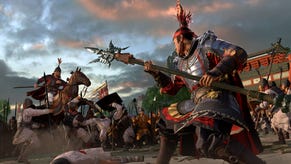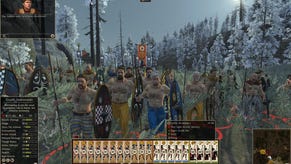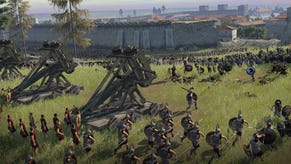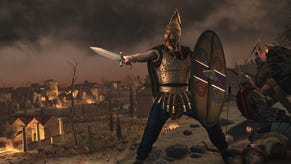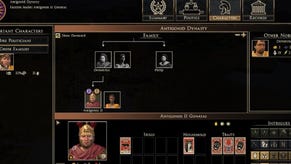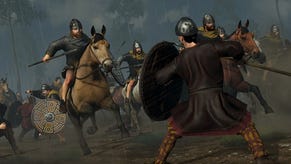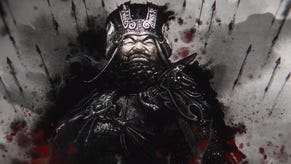The RPS Verdict: Total War: Rome II
"turn the volume right up and clench my fists"
Jim and Adam sat down over a pint of internet to discuss the recently released imperial epic, Rome II. They had things on their mind.
Jim: So then. I am usually in the Total War apologist camp, but not this time. I am not sure if it's because I had a better experience with Shogun 2, or whether there's some kind of allergy due to over-exposure going on, but Rome II rubbed me up the wrong druid.
Adam: A terrible place to be rubbed. Is there any one single complaint that sums up the experience? For me, the scope of the game was enticing but eventually - and in fact almost immediately - problematic.
Jim:Disappointment, is perhaps the overwhelming feeling. I wanted this to be a step forward, but actually I didn't find it to do anything I wasn't expecting, except perhaps a bug where a boat was spinning around and clipping through the beach. Perhaps it was an element of my playing Iceni first, rather than Rome, but I felt myself just hitting the End Turn over and over, without really doing that much, because I couldn't take on my neighbours or do anything much, really. Leveling up my agents seemed like the only activity for a long stretch. Ultimately, I gave up and started Carthage, and that didn't seem to be all that much more interesting - especially in variety of battlefield toys - even though the brighter atmosphere of the Mediterranean made it 36% more palatable. It really is gloomy in Northern Europe!
Adam: I've played seven or eight campaigns - not all to completion obviously - and the opening drags every time.
Jim: I was wondering whether for formula was beginning to break down - whether actually what Total War needs is a fresh start. Things like the length of the AI turn just appalled me this time.
Adam: I think there is a formulaic problem, at least to some extent. In that Shogun II was a step forward in terms of quality but a retreat in so many other ways. There are limits and moving beyond them, as with Empire and now Rome II, causes a sort of collapse.
Jim: Shogun II's limited field seemed to work, but also it seemed to work better in terms of which faction you play. In Rome II choosing an outlier, like Iceni or Carthage, seems to lead only to a long boring grind, with limited access to interesting units.
Adam: I think it's a design problem. The wider world isn't interesting enough - it doesn't feel like things happen there so much as that it exists to be enveloped. There is land and that land has inhabitants, but it's there to be conquered rather than experienced. Too much of it ends up simply being space to be filled.
Jim: Do you think the Paradox games avoid that stuff?
Adam: Not all of them - it's perhaps notable that their take on Japan, Sengoku, suffered from its compactness. Bizarro Total War. EU IV certainly does avoid that problem - but, again, it goes back to the formula. There are definite and more obvious lulls in activity during an EU IV campaign but the player still has options. The world is interesting to observe, a proper simulation, so it's possible to spend time watching and waiting.
Jim: I suppose what irritated me most about Rome II was that it felt less slick than Shogun. When a company is making the same core game year after year, I want their production to be spotless. I didn't feel like that with Rome II. It felt unfinished.
Adam: And also, the Paradox games aren't turn-based. There's no need to punch the clock. Speed up during quiet decades, slow down when need be. I find it stunningly attractive in places and I'm possibly more tolerant of some of the interface deficiencies. It is messy though. Shogun, looking back, feels like a sort of peak that I didn't recognise at the time. It's sad that Rome II has made me more interested in going back to play Shogun II because it's not a period that I have any real interest in.
Jim: I'm not sure Shogun was a better game in design or technical terms, but in production and feel, it was tighter, which I definitely appreciated.
Adam: So was the original Rome, unless memory is betraying me.
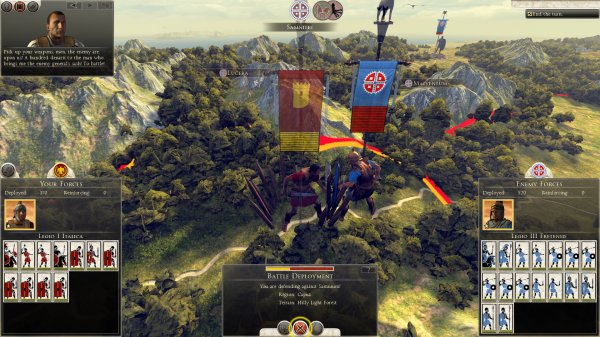
Jim: Oh, I love the era for Rome II, but I found myself frustrated here. The pace of it, that weird thing with agents blocking armies, random unreadable morale collapses in a couple of battles, full on bugs. It really irritated me at times. I want to love it, because I want a Druid Empire that spans the world, but I feel myself being kept at arm's length by it.
Adam: (The Old Gods allows for vast pagan empires!) At the core of the Total War situation is this - Empire and Rome II are the most ambitious and, I'd argue, interesting Total War games. But they're also the most obviously flawed. Total War works best when it's performed within a sort of civil war scenario - contained, controlled and directed.
Jim: Agreed. I suspect this is what has kept Total War from ever doing something radical, like WW1 or Space War, something like that: they know if they stray too far that it breaks down.
Adam: Stretch beyond that for too long and the design doesn't have the chops to keep the player's interest. If you're not at war, you're doing it wrong, and yet there are all of these extra options and features that end up feeling like distractions.
Jim: What's interesting, though, is that it doesn't seem to matter when Total War makes a misstep. It sells a tonne, hundreds of thousands play it, and they move on to the next game. Too big to fail?
Adam: Possibly so. I think this is a bigger misstep than Empire though, if only because people have wanted to go back to Rome for so long. I don't think I was alone in thinking that this would be the one true Total War game.
Adam: The best of what they'd done before with something new.
Jim: Yes, I absolutely felt that this was the moment for triumph, especially after the Teutobourg demos, instead, well, it feels like a faltering moment, crushed under its own enormity.
Adam: What do you make of the historical/larger battles? As standalone things?
Jim: Enjoyable! I always like that aspect. I think, actually, the battlefield part felt more loved this time. I really wanted to get entangled romantically with the campaign map, but it didn't happen. I was far more involved in the tooth and nail brawls in the rain that the battles provide. Had a couple of splendid battles where I repelled invaders trying to take towns. That seemed to work unusually well. As for the historical battles, there's a certain element of "here is a challenge other generals have faced" to it, which I love. There's something about that fact of history - no matter how poor the actual representation of that might compared to the reality - that grips the imagination.
Adam: The battles are also the part of the game that shows off the world's girth more effectively. The landscapes give a great sense of place and the extra variety in unit types actually makes discovering new places and new people rewarding, even if they are unleashing the actual dogs of war onto my face.
Jim: Yes, that's true, although it did have some truly dull maps generate for me in Northern England, perhaps that's accurate?
Adam: Absolutely. I think I even saw a Greggs pasty next to some drizzle and a sodden bus stop at one point.
Jim: I think the thing about Total War games is that they always hit the imagination pretty hard - that context and scale, and the ability to put generals through hell and survive. There's something deeply compelling which explains the ongoing success of the series.
Adam: I love the generals' pre-battle speeches. I turn the volume right up and clench my fists. Stirring moments in the Smith household.
Jim: The TW games don't have that tight ruleset of other strategies, but are instead giant messy colouring pads for expansionist fantasies.
Adam: Yes. And even though they're entirely different as experiences, that's precisely what they have in common with Paradox fare. Both are ridiculous time machines. Windows on to other worlds. The historical truth of them doesn't matter so much as their ability to make you believe. And too much of Rome II's particular messiness is detrimental to its own credibility. It breaks the illusion and so much of what they're offering is illusion.

Jim: Do you think they'll ever attempt something different? We'll see Warhammer Total War, of course. But I wonder if they will ever tread the path that so many want from them: The 20th Century.
Adam: When I spoke to them they said the one thing they didn't wnat to do was anything with a three in it. I can see an American Civil: Total War working. I'm sure that used to be the only wargame setting around. Back in the day.
Jim: You're probably right. Are you recommending people play Rome II? Right now I feel like I can't recommend it, exactly, but can more warn people what they are getting themselves into.
Adam: I think the flames of excitement need to be quenched. I've seen lots of comments about modding already - it'll be worth buying because mods will make it great etc. That's a dangerous road. Perhaps wait until the mods exist. If that is what you crave.
Jim: That always seems like a dangerous thing to say. It's probably true in the case of Skyrim and so on, but it's unproven until it actually happens. Which means you should wait and then study the results of the modding experimentalists and explorers. I do feel, actually, that CA need to make an extra special effort to create a Total War game which is radically open to modding. Then they'll end up with the strategy equivalent of DayZ. Can you imagine? I baffles me that companies don't look at that phenomenon and think: "that has to be worth a roll of the dice". Someone out there would make the space colony Total War conversion that would blow everyone's minds. That WW1 conversion recently was quite the thing, wasn't it. Didn't lift off in popularity, no, but what if you make your RTS so moddable that it spawns the next spin off genre, like DOTA. WHAT THEN.
Adam: It's astonishing. I wonder where and when those conversations take place. Because there surely must be conversations. Could it simply be the difficulty of making tools in some cases?
Jim: Well yes, it's a combined fear of opening the game up to exploitation, and the feeling that releasing the tools means polishing them for end users. I am not sure that's always the case, but Arma 2's great power was the scenario editor and scripting, which allowed all kinds of antics I can't think of a strategy game that provides that sort of access, and I am not certain there is one.
Adam: Somebody will tell us in the comments.And I gather you are proposing something more along the lines of a strategy game built to be moddable from the very beginning? I can't think of it.

Jim: Ah yes. Access to the great unblinking eye of Sauron that is the internet. Anyway, we should sum up. Rome II, then, is like a huge tome of fine history that is engrossing, but poorly edited. Some of the pages are discoloured through age, but the sheer fact of it remains. Like a monument in the desert. Or perhaps an old friend, who talks a good talk, but has become portly and eccentrically attired. You have heard his stories many times, and the embellishments over time make their more lurid, even if the basic story remains the same. God, I love metaphors. Being a writer is awesome.
Adam: I feel that Total War should be a coiled armadillo rather than Rome IIs jellyfish. The strategy map would be better served as an ancillary to combat rather than an attempt to Civilize the series. Supply routes, ambushes - short-term solutions to problems of war. A series of spectacular snapshots of moments rather than a historical epic.
Jim: You may be right. It is not so.
Rome II is out now.
